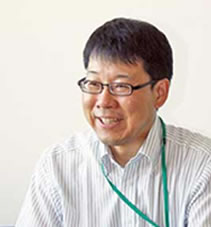INTRODUCTION OF LABORATORY
Solid surfaces are intriguing objects; novel structures and electronic properties emerge as a result of symmetry breaking of bulk. In addition, a solid surface plays an important role as a “low dimensional reaction field”, on which we can supply atoms/molecules and manipulate them deliberately. In order to fabricate atomically-controlled surface materials, the dynamical behavior of atoms and molecules on surfaces should be understood. These subjects are closely related to the basics of catalysis, semiconductor fabrication, organic devices, solar cells etc. In addition, the concepts in surface chemistry are very useful to understand elementary reactions in environmental and cosmic chemistry. In order to investigate structures, reactions and electronic properties of atoms and molecules on surfaces, we have utilized surface vibrational spectroscopy, photoelectron spectroscopy and scanning tunneling microscopy. Synchrotron radiation (KEK-PF, SPring8 etc.) is also used to study electronic structure of surface and interface.
80KのSi(100)c(4×2)表面のダウンダイマー原子に選択的に結合したトリメチルアミン分子のSTM像とモデル図














